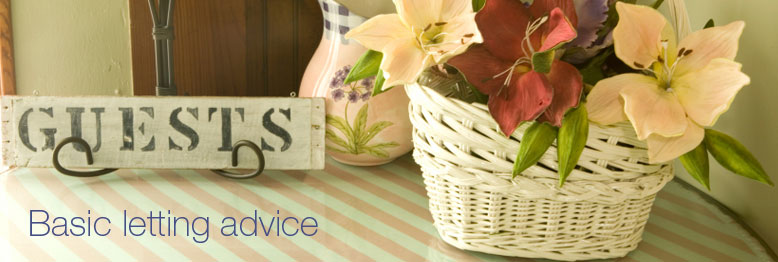- Home
- Advertisers Information
- Basic Letting Advice
Basic Letting Advice
This page provides basic information, guidance, hints and tips on holiday lets. We hope you find these useful but please remember, it is not a comprehensive guide. Tax and insurance, financial, legal, medical, safety and security advice will require professional consultation.
Enquiries
Respond to enquires quickly. Some customers may make several enquiries at once and an efficient friendly service will give a good impression. Check the Spam filter on your email – you don’t want enquiries filtered out by mistake. A follow-up phone call or email can often result in a booking.
Booking
Save time by creating standard paperwork such as letters, a booking form and a rental agreement/contract, setting out your terms and conditions and cancellation policy. As soon as you make a booking, update your availability calendar to show those dates as unavailable.
Payment
Give the customer clear instructions of the ways to pay. You can use cheque, bank transfer or online methods such as PayPal. You may wish to take a deposit on booking and then receive the balance a few weeks before the start date. Provide the customer with a receipt for any monies paid. Ensure that all monies are cleared and in you account before issuing receipts and keys.
Security Deposit
A security deposit is a way of ensuring you are covered should any damage, losses or breakages occur to your property. This encourages the customer to treat your property with respect and leave it as found. The amount of deposit you charge will be largely dependant on the value of the contents, but too high a figure may put people off. Inform your customer how and when their deposit will be returned. If deductions are necessary, notify them in writing with an itemised list. If loss or breakage exceeds the amount of deposit, you may need photographic evidence for insurance purposes.
Keys
However you decide to hand over the keys – whether it is personally, via a representative, or by recorded delivery in the post, make sure instructions are clear and that all monies have been cleared. Guests may request more than one set of keys - ensure you keep a log book. As an alternative to keys you could use a combination lock for access to your property, remember to re-programme the code after each visit.
Directions
Supply a map and directions of how to get to your property. Give information about the nearest airport, bus and train links, taxi companies, car hire etc. It is a good idea to phone holidaymakers the day before to make sure everything is ok and confirm their arrival times.
Welcoming your Guests
Provide a folder with instructions about the property and the local area and keep it in a prominent location where people will easily find it. Include a good map, useful information, operating instructions for equipment, brochures of local restaurants, attractions and activities, times of local markets, best beaches etc.
It is a nice gesture to provide a welcome basket with a collection of basic essentials such as fresh bread, butter and milk and perhaps a bottle of wine or chocolates. This is an especially good idea if the property is in a remote area or the holidaymakers are arriving late at night.
Extra services
Depending on the type of property and your market, you may consider providing extra services to your customer, such as babysitting, cooking, laundry or a daily maid.
Guestbook
Leave a guestbook at your property; holidaymakers can use this to make comments and give useful tips such as good local restaurants etc. Feedback is productive – it is helpful to know if you are doing things right or if there are any areas you need to improve upon.
Cleaning
Ensure your property is kept scrupulously clean. If you do not live close to your holiday home, you may need to employ a trustworthy local cleaner or agent to clean and change the sheets and towels on changeover days. Some will be able to inspect the property for you to make sure everything is in order, and to handover keys.
Maintenance
Keep a basic supply of tools at your property for general maintenance jobs. If an item is broken, repair it straight away.
Security
It is a good idea to provide guests with a safe to store their valuables. Locate this in a secure, hidden position. If you visit the holiday home regularly yourselves, get a lockable chest or cupboard, where you can store all your personal belongings.
Emergencies
Make a list of local emergency contact numbers such as police, fire and ambulance services, doctor, dentist, nearest hospital, coastguard, lifeguard, chemist, emergency plumber, glazier, and electrician. These should be clearly displayed in your property. Provide a first aid kit that complies with local regulations and your insurance policy, and keep it in a prominent position. Make sure the contents are regularly checked and replenished if necessary.
Install smoke alarms and a fire extinguisher/s as recommended by the fire brigade (check your insurance policy for requirements) and have these serviced regularly. Display the fire procedure throughout your property.
Make sure the holidaymaker has your emergency contact number and ask a neighbour to keep a spare key.
Cancellations
Cancellations can happen at any time, sometimes at very short notice. Your cancellation policy should guide you on re-arranging dates and refunding any payments made. Always double check that a payment has properly cleared before paying out a refund.
If you are left with last minute vacancies, consider using our ‘Featured Property’ section to give your property added exposure.
Complaints
Listen to your customer. Misunderstandings can arise because of poor communication, and standards or expectations are sometimes not met. If it is your mistake, do your best to rectify it in a calm professional manner.





